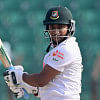Tamim told me how the wicket was going to behave: Maharaj

South Africa left-arm spinner Keshav Maharaj on Wednesday admitted that he asked for advice from former Bangladesh skipper Tamim Iqbal regarding the conditions in Mirpur and also claimed that the southpaw was spot on about how the surface was going to behave.
Earlier this year, Maharaj played for the Fortune Barishal, captained by Tamim, in three of their matches during the 10th edition of Bangladesh Premier League.
Both the players developed a good relationship while playing in the BPL and when Maharaj came to Bangladesh with the Proteas to play the ongoing two-match Test series against the hosts, he texted Tamim straightway to know more about the conditions and what to expect from the wickets.
"Yeah, I just sent Tamim bhai a message. I have got a good relationship with him, obviously playing in the BPL," said Maharaj, who has already taken six wickets so far in the opening Test against Bangladesh at the Sher-e-Bangla National Cricket Stadium in Mirpur.
"I just asked for some advice relating to the conditions and how to go about business, and he gave me a few words in terms of how the wicket would play, and yeah, it wasn't wrong. And he read the wicket to the tee."
After a difficult start to the match, Bangladesh staged a fightback on Day 3 as Mehedi Hasan Miraz (87 not out) and Jaker Ali Anik (58) scored fifties and put together a 138-run stand for the seventh wicket before rain and bad light forced an early close to the day's proceedings. The Proteas are still on top as the hosts lead by 81 runs with only three wickets left.
"Bangladesh have done really well today. The conditions got a little bit better, if I'm honest, with a slightly used ball. But I think we're still ahead. Bangladesh have a lead and we've got three wickets more to go," Maharaj said after the third day of the match.
"We can restrict them as much as possible, but I still feel we'll be in the driving seat, considering the good work that our batters have done in our first innings.
"Look, ideally we'd like to restrict Bangladesh to 100 or below that but it's important that we start well in the morning and then assess from there."

 For all latest news, follow The Daily Star's Google News channel.
For all latest news, follow The Daily Star's Google News channel. 








Comments